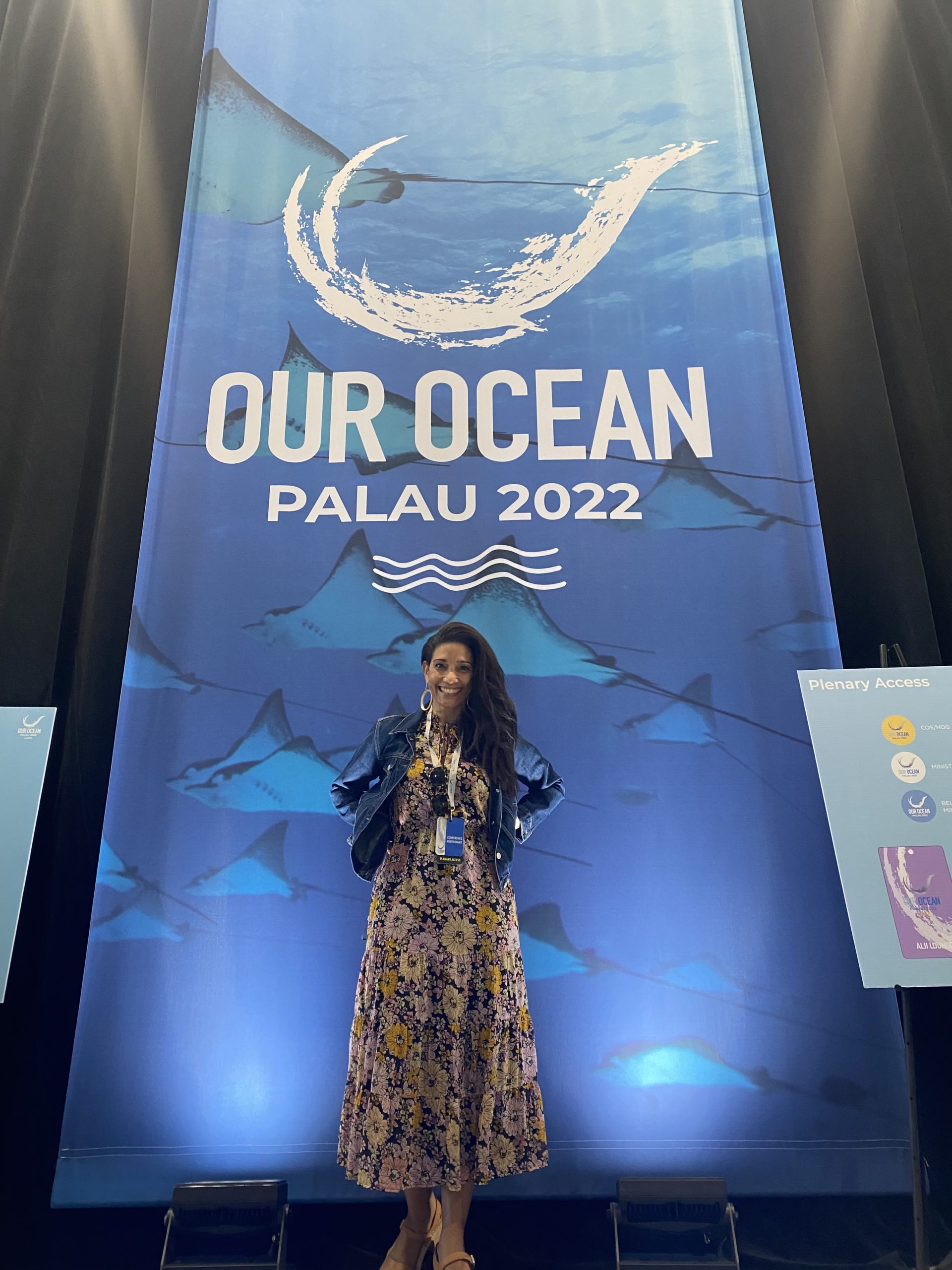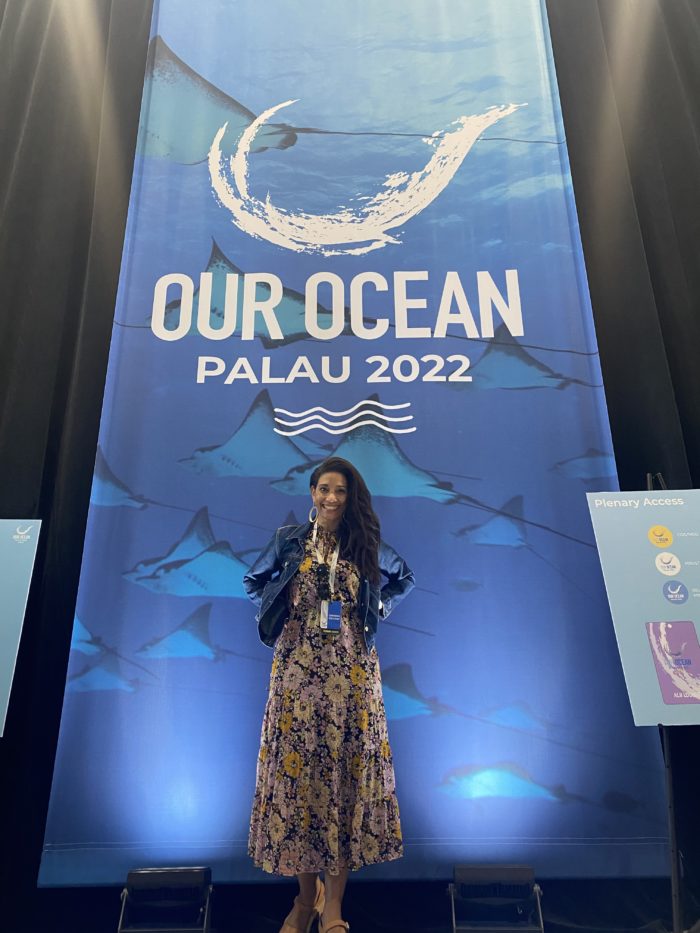
CHOW Chat: Ana Spalding on Climate, Culture, and Community
 The Capitol Hill Ocean Week 2022 program will recognize the 50 years of progress achieved in ocean and coastal conservation and set a course for the new policies and actions necessary to sustain our waters and transform our future. Ana Spalding is a member of the 2022 CHOW Advisory Committee, an Associate Professor in the School of Public Policy at Oregon State University; and Research Associate at the Smithsonian Tropical Research Institute in Panama. Her research encompasses the human dimension of the marine environment. Current work includes policy analysis and science-to-policy pathways in the context of climate change (e.g. ocean acidification) adaptation strategies by resource-dependent communities along the U.S. West Coast. We spoke with Ana about her role on the Advisory Committee, her hopes for this year’s conference, and her vision for the next 50 years of ocean and coastal conservation. Register today at CapitolHillOceanWeek.org!
The Capitol Hill Ocean Week 2022 program will recognize the 50 years of progress achieved in ocean and coastal conservation and set a course for the new policies and actions necessary to sustain our waters and transform our future. Ana Spalding is a member of the 2022 CHOW Advisory Committee, an Associate Professor in the School of Public Policy at Oregon State University; and Research Associate at the Smithsonian Tropical Research Institute in Panama. Her research encompasses the human dimension of the marine environment. Current work includes policy analysis and science-to-policy pathways in the context of climate change (e.g. ocean acidification) adaptation strategies by resource-dependent communities along the U.S. West Coast. We spoke with Ana about her role on the Advisory Committee, her hopes for this year’s conference, and her vision for the next 50 years of ocean and coastal conservation. Register today at CapitolHillOceanWeek.org!
How have you hoped to shape this year’s Capitol Hill Ocean Week through your role on the Advisory Committee?
The committee is so diverse! We are scientists, advocates, Indigenous stewards of the land and ocean, social media and tech experts, and non-profit representatives. It is really a treat to work with such a great advisory committee. I see my role on the Committee as twofold. I am here to advocate for and support the inclusion of the human dimension of the ocean. Ocean science tends to be strongly influenced by the natural and physical sciences, yet there is a wealth of marine social science information out there that can help us better understand and manage our oceans. I am also here to co-create ideas with other committee members, with a vision to support the National Marine Sanctuary Foundation and other CHOW partners in offering yet another great event. Great ideas are born from connections and exchange with others. This is a fantastic opportunity to do just that!
What are you most looking forward to during Capitol Hill Ocean Week 2022?
I’m excited about all of it! The theme of this year, Sea: The Future, feels particularly relevant at this moment when we are grappling with co-occurring health, social and environmental crises. We MUST think creatively to envision a future where people and the sea find a balance and can heal. Humans serve as drivers of change, recipients of that change (typically negative outcomes disproportionately affecting the most vulnerable coastal communities), and as solution-finders. I’m looking forward to learning from all the great speakers and panelists about ways in which we can devise a hopeful future for our oceans and the people who depend on it. Also, I teach an Ocean and Coastal Law and Policy class at Oregon State University. I always start and end the class with the question: What’s next in ocean policy? And I can’t wait to see what CHOW has to say about this question.
The theme of this year’s conference is Sea: The Future. What do you envision for the next 50 years of ocean and coastal conservation? What do you hope the ocean conservation community will be able to accomplish?
This is a difficult question. My optimistic answer is that I envision resilient and healthy ocean-dependent communities that continue to support a healed marine environment. Importantly, I hope to see an ocean conservation community that centers PEOPLE. Not just the same people we have always centered. But instead a diversity of perspectives, ways of knowing, understanding, and relating to the ocean. It’s an all hands on deck moment.
How will communities need to adapt to changing ocean and coastal conditions from climate change and ocean acidification in the coming years?
Adaptation comes in many forms. We tend to study adaptation in the context of a particular threat. For instance, there are studies on adaptation to sea level rise, or adaptation to ocean acidification, or to coastal hazards. However, in the real world, these (and other) threats can be co-occurring! And, the factors that affect communities’ ability to adapt are similar across all threats, including access to assets, ability to be flexible in the implementation of their main economic activities, strong social and professional networks, among others. Importantly the ability to adapt, as humans, is dependent on access to the most basic needs such as health, food, education, and housing. Therefore, regardless of the threat, we (governments, civil society, international agencies, NGOs, etc.) MUST work to guarantee these basic human rights. From a scientist perspective it is often easy to make assumptions about what the threats are and how they will affect people. However, research we are currently conducting in Oregon and California on adaptation to Ocean Acidification has shown that the things that people are doing to adapt to global change are often very similar to the things we all do on a daily basis to keep our business afloat, to take care of our children, and to live fulfilled lives. Simply put, while there is a critical need for infrastructure and technologies to support adaptation, another, often undervalued, element is to focus on supplying communities with basic human needs and engage them in decision-making around adaptation so it truly reflects the particular conditions and situation of the local community.
How can protecting our ocean help us to achieve climate and societal goals?
The ocean is a great source of climate solutions! It absorbs CO2, it can be a source of renewable energy, it can protect coastal communities from storms and other hazards, and it connects people and communities seeking to work together towards shared climate resilience goals. In this context, protecting the ocean is a no brainer! Importantly, the ocean also represents a source of livelihoods, cultural identity, and is a place of wonder to many. Considering both its role as a nature based climate solution and the cultural and well-being important of the ocean, I think that the question here might be re-phrased to ask: how can protecting people and the ocean help us to achieve climate and societal goals?
How can we achieve equity in the Blue Economy, and why is this important?
Oh, if only I had the answer to this question! This is my life’s work, and it will be hard to summarize it in a paragraph. It is essential that we consider equity and justice in all sectors of the Blue Economy because society has typically excluded the most vulnerable communities from ocean action (whether it’s industry or conservation-related), yet these are the communities who are mostly affected by climate change, loss of livelihoods, reduced availability of marine resources, and other ocean-based threats. To do this, we must not only consider the economic value of ocean-based industries; but we must also consider the environmental implications of such industries as well as their social and cultural impacts. The definition of the Blue Economy has been co-opted by governments and industries to reflect any and all activities that are carried out in and around the ocean. Quantifying the Blue Economy in this way provides an impressive number of dollars. However, how those dollars are distributed is less of a headline. And I think we all know they are often not distributed equally to those most in need.
My understanding of the Blue Economy is more specific to the inclusion of industries that are socially just and environmentally sustainable. To that end, perhaps the first step to achieving equity in the Blue Economy is to emphasize and share this definition. This would allow us to think before we un-critically celebrate ocean industries’ contributions to the economy. Or before we continue to support industries that have a legacy of causing harm to vulnerable coastal communities and Indigenous peoples. A lot of work is needed in this space, so I will leave it at this idea of the importance of recognizing and acknowledging a definition of the Blue Economy that is, in itself, more equitable and sustainable as a first step. Actions to ensure that those industries that make the cut under this definition must then be accountable to standards of equity across several domains such as procedural, recognitional, and distributional justice.

Photo credit: Ana Spalding
